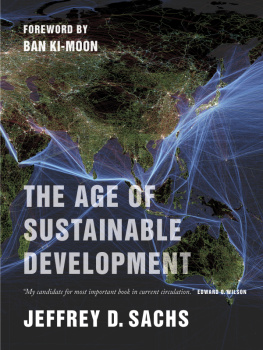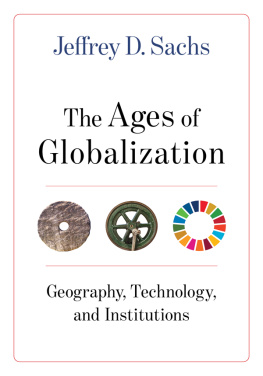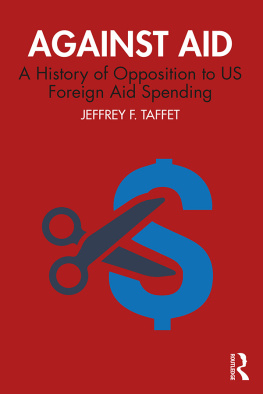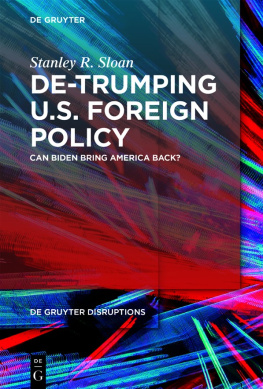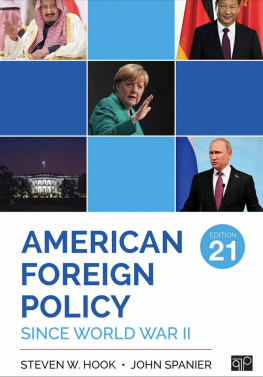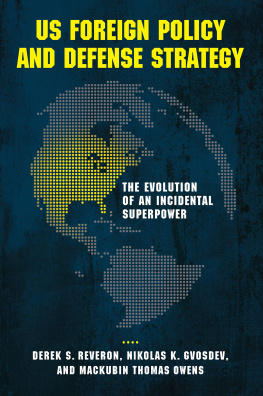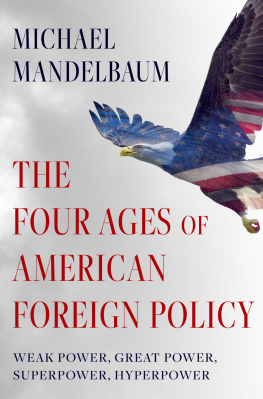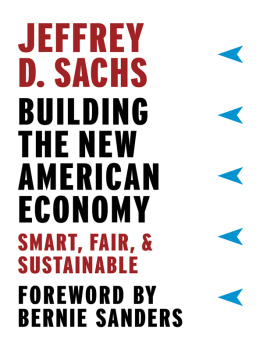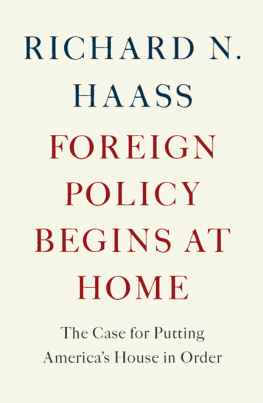Table of Contents
A NEW FOREIGN POLICY
JEFFREY D. SACHS
A NEW FOREIGN POLICY
BEYOND AMERICAN EXCEPTIONALISM
Columbia University Press
New York
Columbia University Press
Publishers Since 1893
New York Chichester, West Sussex
cup.columbia.edu
Copyright 2018 Jeffrey D. Sachs
All rights reserved
E-ISBN 978-0-231-54788-8
Library of Congress Cataloging-in-Publication Data
Names: Sachs, Jeffrey, author.
Title: A new foreign policy: beyond American exceptionalism / Jeffrey D. Sachs.
Description: New York: Columbia University Press, 2018. | Includes bibliographical references and index.
Identifiers: LCCN 2018006069 (print) | LCCN 2018012223 (ebook) | ISBN 9780231547888 (electronic) | ISBN 9780231188487 (cloth: alk. paper)
Subjects: LCSH: United StatesForeign relations21st century. | ExceptionalismUnited States. | International economic relations. | International cooperation.
Classification: LCC JZ1480 (ebook) | LCC JZ1480 .S23 2018 (print) | DDC 327.73dc23
LC record available at https://lccn.loc.gov/2018006069
A Columbia University Press E-book.
CUP would be pleased to hear about your reading experience with this e-book at .
Cover design: Lisa Hamm
In memory of my mother,
Joan Barbara Sachs,
who loved peace
CONTENTS
T he United States is failing to secure the benefits of affluence and rising global prosperity. At home, the United States is richwith a per capita income of around $60,000and getting richer. Globally, the United States is part of a world economy that is advancing rapidly in income, technology, and education. This should be a time of confidence and rising well-being for Americans, yet instead it is a time of disarray, division, and unhappiness. A large majority of Americans feel that the country is moving in the wrong directionand they are correct.
In domestic politics, the United States is squandering its affluence as the super-rich relentlessly pursue more wealth at any cost. Meeting the needs of the poor, modernizing infrastructure, and protecting the environment are put aside in favor of cutting taxes for the rich, slashing public investments, and eliminating environmental regulations. The United States gets richer and unhappier at the same time, with devastating damages from climate change, falling life expectancy, soaring public debts, and rising political polarization.
In foreign policy, the situation is no better, as the United States is rapidly losing its global influence. The United States under Donald Trump is making enemies in nearly all parts of the world, even among traditional allies in Canada and the European Union, as well as with China, Russia, Iran, and countless others. America First is a provocation for the rest of the world, replete with American threats of trade wars, broken promises, and unilateral actions by the United States thwarting hard-won international agreements. Tensions are high and rising.
Trumps provocations are a reckless extension of a long-standing and dangerous mindset of American exceptionalism. Even when America was helping to set the global rules of trade, finance, and diplomacy after World War II, American leaders held the view that America was different, ultimately exceptional, with the inherent right to make and break the international rules of the game. The dark side of American foreign policy has long been the resort to regime change and unilateral wars, not sanctioned by the United Nations and opposed by much of global and U.S. public opinion. Trump manipulates the long-standing sense of exceptionalism, and links it to wildly exaggerated grievances against the rest of the world.
In my recent book, Building the New American Economy, I discussed a better way for U.S. economic management, focusing on investment-led growth oriented around the challenge of sustainable development. Sustainable development means an economy that is not only rich but also socially inclusive and environmentally sustainable. The United States achieves only one-third of the sustainable development agendawealthwhile ignoring or even scorning the social and environmental objectives. While I had a fleeting hope that Trump the Builder would at least invest in American infrastructure, it is now clear that Trump will invest only in Trump and in added wealth for the richest Americans. Nonetheless, the need for sustainable development will only grow over time, and will ultimately, I believe, set the agenda in the post-Trump era.
This current volume is a companion study to the economics volume, focusing on the urgent need to revamp American foreign policy. Its theme is the same: the challenges of sustainable development (including global cooperation to head off dangerous human-induced climate change) should guide and define U.S. foreign policy in the coming generation. The exceptionalist mindset is especially dangerous today. America is part of a world with shared challenges needing shared solutions. In any event, Americas powereconomic, military, and technologicalis far less exceptional than Trump and other foreign policy leaders may believe.
I recognize that the arguments in this volume may not sit well with many Americans, who have long been told that America is the sole superpower with the ability to impose its will on the rest of the world. Americans have long debated whether America should be the worlds policeman, mostly taking it for granted that America can serve as such if it likes. This volume argues otherwise: that it does not make sense for America to go it alone, and that in any event, American power is far too limited to take on the rest of the world in a fit of Trumpian pique. Most importantly, the world shares a vital and urgent common interest in sustainable development. We will all lose unless we maintain the peace and the cooperation needed to end human-caused climate change, loss of biodiversity, massive pollution of the air, water, and land, and the growing inequalities of wealth, income, and power.
We live in a world of rapid technological advance. If we choose right, and harness our hard-won know-how, we can accomplish great things in our time: ending poverty, stabilizing the climate, and improving the quality of lives for billions of people including, of course, the American people. This book is offered in the hope that it will make a contribution toward a wiser, more peaceful, and more prudent American role in the world.


